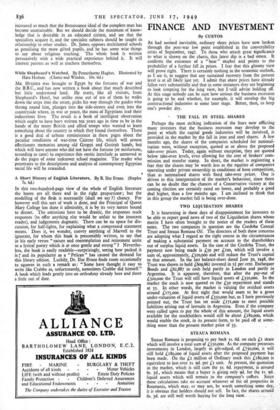FINANCE AND INVESTMENT
By CUSTOS As had seemed inevitable, ordinary share prices have now broken through the post-war low point established in the convertibility crisis of September, 1947. To those who attach great significance to what is shown on the charts, this latest dip is a bad omen. It confirms the existence of a " bear " market and points to the probability of a further fall in prices. I fear that this gloomy view will prove right. There is certainly nothing in the economic outlook, as I see it, to suggest that any sustained recovery from the present level is at all likely just yet. I admit that share prices have already fallen very substantially and that in some instances they are beginning to look tempting for the long view, but I •still advise holding off. At this stage nobody can be sure how serious the business recession is going to be and whether, for example, it will envelop the big constructional industries at some later stage. Better, then, to keep one's powder dry.
- THE FALL IN STEEL SHARES Perhaps the most striking indication of the fears now afflicting many investors that the business recession may develop to the point at which the capital goods industries will be involved, is provided in the market by the fall in iron and steel shares. A few months ago, the shares of the companies scheduled for national- isation were, without exception, quoted at or above the proposed take-over prices. Today, again without exception, they are quoted below take-over levels, even allowing for the cost of brokers' com- mission and transfer stamp. In short, the market is registering a fear that the shares may be worth less as the equities of companies operating under private ownership in conditions of keen competition, than as nationalised shares with fixed take-over prices. One is driven to this interpretation of the market's behaviour, since there can be no doubt that the chances of a Conservative victory at the coming election are certainly rated no lower, and probably a good deal higher, than a few months ago. I am inclined to think that in this group the market fall is being over-done.
TWO LIQUIDATION SHARES
It is heartening in these days of disappointment for investors to be able to report good news of two of the Liquidation shares whose merits I have often brought to the notice of the readers of these notes. The two companies in question are the Cordoba Central Trust and Steaua Romana Oil. The directors of both these concerns are adopting what I regard as the right course in the circumstances of making a substantial payment on account to the shareholders out of surplus liquid assets. In the case of the Cordoba Trust, the payment now being made is £5o per £too, which will involve a sum of, approximately, £32o,000 and will reduce the Trust's capital to that amount. In the last balance-sheet dated June 3o, 1948, the Trust was shown to hold £609,662 invested in II per cent. Exchequer Bonds and £62,887 in cash held partly in London and partly in Argentina. It is apparent, therefore, that after the pay-out of £320,000 the Trust will still have liquid assets of £35o,000. In the market the stock is now quoted ex the £50 repayment and stands at 55. In other words, the market is valuing the residual assets around k175,000. At first sight that would seam to be a gross under-valuation of liquid assets of £350,000 but, as I halie previously pointed out, the Trust has set aside £171,000 to meet possible liabilities arising out of lawsuits in Argentina. Even if the company were called upon to pay the whole of this amount, the liquid assets available for the stockholders would still be about £180,000, which would enable the stock, in its present form, to be paid off at some- thing more than the present market price of 55•
STEAUA ROMANA
Steaua Romana is proposing to pay back 5s. 6d. on each Li share which will involve a total sum of £550,000. As the company possesses investments in London, largely in gilt-edged, of £730,000, it will still hold £18o,000 of liquid assets after the proposed payment has been made. On the £2 million of Ordinary stock this £180,000 is equivalent to just over Is. 9d. per LI unit. At present, the quotation in the market, which is still cum the 5s. 6d. repayment, is around
6s. 3d., which means that a buyer is giving only 9d. for the Is. 9d. liquid assets which will remain in the company's coffers. Since these calculations take no account whatever of the oil properties in Roumania, which may, or may not, be worth something some day, it is obvious that holders should not sell. In fact, the shares around 6s. 3d. are still well worth buying for the long view.






































 Previous page
Previous page